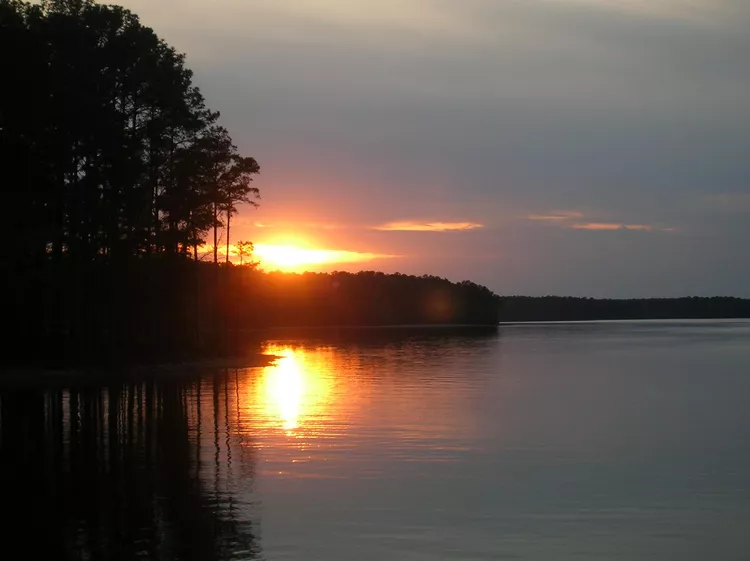These are my favorite bass lakes in Georgia. I regularly fish about 21 major reservoirs, but these ten rank among my favorites. Some lakes excel during specific times of the year, which is noted in the descriptions. If you’re fishing in Georgia, consider these lakes for a rewarding experience.
1. Clark’s Hill Lake
Growing up on Clark’s Hill Lake, which spans 72,000 acres and is managed by the Corps of Engineers, I’ve come to appreciate its offerings. The lake features abundant public access and camping areas. Bass fishing is productive throughout the year, particularly in spring during the blueback herring spawn. In April and May, look for schooling fish on humps and islands while using Spooks and Flukes. In summer, concentrate on long points and hydrilla beds, and switch to crankbaits along clay and rock areas in the fall. During winter, jig spoons become effective.
2. Lake Hartwell
Hartwell is a 56,000-acre lake managed by the Corps of Engineers with ample public access, including numerous boat ramps and campgrounds. Spring blooms with bass feeding on blueback herring during their spawn. Target islands and high spots using topwater baits in April and May. Following the spawn, bass can be “called up” in these same hotspots throughout the summer. In the fall, crankbaits work well in creeks, while jigging spoons and bucktails excel in the lower lake during winter on long points.
3. Lake Oconee
Lake Oconee, a 19,000-acre Georgia Power lake, delivered my best catch ever: 9 bass weighing 37 pounds over two days in a March tournament. The lake experiences currents from pumpback operations, making current flow crucial for fishing success. In summer, fish humps and points with Carolina-rigged worms and large crankbaits. During spring, spinnerbaits prove effective in the backs of coves. Docks provide fishing opportunities year-round; try flipping or pitching jigs and plastic worms near them.
4. Lake Sinclair
Covering 15,000 acres, Lake Sinclair is another Georgia Power lake located downstream of Lake Oconee. It also benefits from fluctuating currents. This lake is ideal for winter fishing due to warm water discharge from a nearby power plant. Utilize crankbaits and jigs around shallow cover, such as docks, throughout winter. In spring, fish the backs of coves with spinnerbaits and worms. Docks maintain their value in summer, along with crankbaits around rocky or clay areas during fall. Carolina rigs remain effective on points year-round.
5. Jackson Lake
Lake Jackson encompasses 4,750 acres and is one of Georgia’s oldest lakes, historically rich in fertility. It used to provide phenomenal fishing experiences due to runoff. My first two 8-pounders were caught there in January tournaments during the 1970s. Today, while it still yields good bass, many areas exhibit numerous spots. Fish crankbaits during fall, winter, and early spring, while focusing on docks and points during summer, especially in the backs of coves and creeks in spring.
6. Lake Lanier
Spanning 38,000 acres, Lake Lanier is managed by the Corps of Engineers and is a hotspot for spotted bass, with 5-pound specimens commonly caught. Utilize spinnerbaits and topwater lures on points and humps in late spring when bass are active from feeding on blueback herring. The spots continue biting year-round, so employ jerk baits for them during winter. In spring, fish humps and points, as well as pockets, using tubes and lizards, benefiting from the lake’s clear waters.
7. West Point Lake
West Point covers 26,000 acres and frequently hosts national tournaments due to its great structure, including many man-made brush piles. Summer fishing thrives on main lake structures, especially during current movements. In spring, explore creek backs and coves with spinnerbaits and Rat-L-Traps. Fall fishermen should try crankbaits on riprap and clay points. Winter reveals deep brush where jigging spoons can yield great results; note that the lower lake maintains clearer conditions in winter.
8. Bartlett’s Ferry
Renowned as Lake Harding, this Georgia Power lake spans 850 acres and is dotted with boat docks. The lake can become crowded in warm weather; however, bass can still be found on long points and main lake structures using worms. During winter, jigs and spoons are successful in the same areas. In spring and fall, explore boat docks with crankbaits and plastics. For a quieter experience in summer, venture upriver for moving water opportunities. Topwater fishing also works well here for nearly nine months of the year.
9. Lake Eufaula
Also known as Walter F. George, Lake Eufaula is a 45,000-acre lake managed by the Corps of Engineers. It gained fame thanks to Tom Mann’s Jellyworms and offers excellent bass fishing in both quality and quantity. River ledges consistently hold large bass; use big crankbaits and worms, or Ledgebuster spinnerbaits from late spring to fall. Late winter to late spring is prime for fishing grassbeds with spinnerbaits and topwaters, while jig and pig techniques in brush and stump fields yield success during winter months.
10. Lake Seminole
Known for its grassbeds and alligators, Lake Seminole is a 37,500-acre Corps of Engineers lake that demands attention. The hydrilla beds are particularly fruitful from late spring to fall when using plastic baits and topwater lures. Standing timber is a popular spot during winter when employing spoons and plastics. For an exhilarating adventure, head up the Flint River to the shoals and cast crankbaits and topwater lures for shoal bass. The lake, situated near the Florida border, often sees bass spawning as early as January and February.
Share Your Favorite Lakes
These represent my favorite bass lakes in Georgia. Feel free to share your personal favorites and experiences as well!




